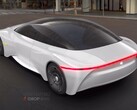The advanced driving assistance systems (ADAS) that will lead to fully self-driving cars is an inevitable part of the future - or so companies as Tesla assert at present. Its current automobiles and their iteration of auto-pilot are powered by the Samsung Exynos Auto platform, which it has supplied in 14nm form. However, according to Asian Economy, their successors are to get much more modern soon.
The outlet claims that Samsung and Tesla will work together to develop a new, 5nm automotive processor for the cars of the future. Moreover, it will apparently be manufactured using the extreme ultraviolet (EUV) lithography normally reserved for PC- or mobile-grade processors.
This, apparently, is in line with Elon Musk's company initiative to upgrade the in-car experience until it is as engaging and potentially entertaining as that of using a smartphone. That does make sense of a sort: if none of a vehicle's occupants have to keep an eye on the road any more, they might welcome a system to prevent boredom while driving (or being driven, rather).
Then again, this prospect is still most likely years away; similarly, Asian Economy does not specify an exact launch or release window for this new 5nm Tesla-destined Samsung Exynos Auto silicon.
The Exynos 990-powered Samsung Galaxy S20 FE is now on Amazon






















